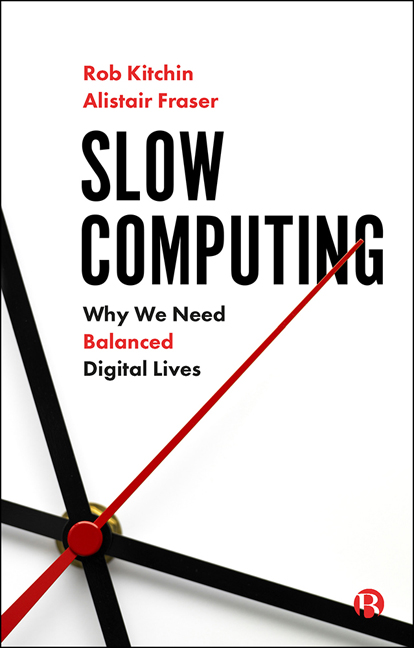Book contents
- Frontmatter
- Dedication
- Contents
- About the authors
- Acknowledgements
- 1 Living Digital Lives
- 2 Accelerating Life
- 3 Monitoring Life
- 4 Personal Strategies of Slow Computing
- 5 Slow Computing Collectively
- 6 An Ethics of Digital Care
- 7 Towards a More Balanced Digital Society
- Coda: Slow Computing During a Pandemic
- Notes
- Index
6 - An Ethics of Digital Care
Published online by Cambridge University Press: 12 March 2021
- Frontmatter
- Dedication
- Contents
- About the authors
- Acknowledgements
- 1 Living Digital Lives
- 2 Accelerating Life
- 3 Monitoring Life
- 4 Personal Strategies of Slow Computing
- 5 Slow Computing Collectively
- 6 An Ethics of Digital Care
- 7 Towards a More Balanced Digital Society
- Coda: Slow Computing During a Pandemic
- Notes
- Index
Summary
Saturday. 11am. You’ve got withdrawal symptoms. You haven't touched your smartphone all morning. The laptop is closed. The kids’ games machine is turned off. You really want to check your emails, to see if anyone responded to your latest Facebook post, to catch up with what's happening in the world. You think about taking a quick peek, but your partner reminds you that it’ll all be waiting for you later; that none of it is going to disappear; that your family is more important. Usually, you would ignore all this and reach for the phone in any case. Today, however, you turn it to silent and head off for a family trip to the park, where you have a great time untethered from the digital leash. You realize it actually feels good to forget about being online and constantly fretting about who thinks what, or what needs to be done. You’d still like a sneak peek, but you’re determined to resist and enjoy a lazy lunch.
We need a new ethics of digital care. We need to adopt and enact a philosophy of slow computing – of stepping back and uncoupling the digital leash to reestablish control over our time and our digital footprints and shadows. We stand to experience the joys of computing, while minimizing some of the more pernicious aspects of the emerging digital society and economy if we pursue individual and collective, practical and political, actions. In this chapter, we extend our overall argument by developing the philosophical underpinnings of, and for, slow computing. The target is a rationale and imperative for adopting slow computing; for its practice not just by individuals but also by wider society, including companies. While we could practise slow computing without embracing slow philosophy or becoming members of a slow computing movement – simply adopting some actions as they suit – our practices gain meaning and maximize their impact if they are rooted in a coherent set of ideas and ideals that justify and promote them.
At issue here is understanding the key normative arguments for slow computing. By ‘normative’ we mean a type of thinking concerned with how things should be, not how they presently are.
- Type
- Chapter
- Information
- Slow ComputingWhy We Need Balanced Digital Lives, pp. 134 - 156Publisher: Bristol University PressPrint publication year: 2020
- 1
- Cited by



